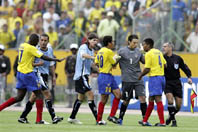Ecuador's soccer-fertile valley
Eleven-year-old Romario Ibarra was named by his father for the great Brazil striker. But like countless soccer-crazed children in this impoverished region of Ecuador, his hero on the pitch grew up almost next door.

The player he and most Ecuadoreans affectionately call "Tin," the hard-kicking center forward Agustin Delgado who is behind his national team's surprise World Cup run, is a living legend in this tropical valley nestled among the Andes, 95 kilometers (50 miles) northeast of the capital Quito.
But Tin is not the only player to have grown up in this valley, which was settled 200 years ago by runaway slaves. When little-known Ecuador, in just its second World Cup appearance, takes on powerhouse England on Sunday in a second-round matchup, nowhere will the game be more closely followed than here.
Four of Ecuador's starters hail from the Chota valley _ forward Edison Mendez, defenders Ulises De la Cruz and Geovanni "The Shadow" Espinosa, in addition to Delgado. Many more compete on the country's best clubs.
Like Romario, all began their rise to the soccer world's most prestigious tournament by playing barefoot on grassless pitches.
The valley's population, almost entirely black, survives on the farming of vegetables, beans, and tomatoes, but the boys and girls raised here want nothing to do with the backbreaking labor of their parents and grandparents.
Instead, they dream of following in the footsteps of their famous brethren, many of them distant relatives.
"It's every young boy's dream to become a soccer player," said Rene Ibarra, Romario's father.
In a country little known for its soccer prowess and where, unlike their counterparts in other South American nations, players are all but passed over by the big clubs of Europe, such idol worship of homegrown players may seem out of place.
But not to Romario, who's something of a child phenomenon in El Juncal, reports AP.
O.Ch.
Subscribe to Pravda.Ru Telegram channel, Facebook, RSS!


